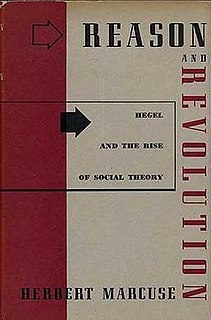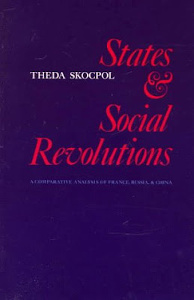 W
WThe Anatomy of Revolution is a 1938 book by Crane Brinton outlining the "uniformities" of four major political revolutions: the English Revolution of the 1640s, the American, the French, and the 1917 Russian Revolution. Brinton notes how the revolutions followed a life-cycle from the Old Order to a moderate regime to a radical regime, to Thermidorian reaction. The book has been called "classic, "famous" and a "watershed in the study of revolution", and has been influential enough to have inspired advice given to US President Jimmy Carter by his National Security Advisor Zbigniew Brzezinski during the Iranian Revolution.
 W
WContinuity and Rupture: Philosophy in the Maoist Terrain is a 2016 book written by J. Moufawad-Paul. The book provides a philosophical analysis of the theoretical foundation of the Marxist school of thought developed by Chinese revolutionary Mao Zedong, Maoism. Moufawad-Paul argues that the political ideology of Maoism, despite being formulated in the 1960s, only achieved full theoretical maturity in 1988 in Peru.
 W
WThe Development of Capitalism in Russia was an early economic work by Lenin written whilst he was in exile in Siberia. It was published in 1899 under the pseudonym of "Vladimir Ilyin". It established his reputation as a major Marxist theorist.
 W
WEpisodes of the Cuban Revolutionary War, also titled Reminiscences of the Cuban Revolutionary War, is an autobiographical book by Marxist revolutionary Che Guevara about his experiences during the Cuban Revolution (1956–1958) to overthrow the dictatorship of Fulgencio Batista.
 W
WExplosion in a Cathedral is a historical novel by Cuban writer and musicologist Alejo Carpentier. The book follows the story of three privileged Creole orphans from Havana, as they meet French adventurer Victor Hugues and get involved in the revolutionary turmoil that shook the Atlantic World at the end of the eighteenth century. Originally published in 1962, this is one of the most influential works written during the so-called "Latin American Boom".
Fire in the Minds of Men: Origins of the Revolutionary Faith is a book about the spread of ideas written by James H. Billington, historian and Librarian of Congress. The book analyzes the ideas that inspired European revolutionary movements from the 1700s to the 1900s.
 W
WKarl Marx's Theory of Revolution is a 5-volume work (1977–1990) about the philosopher Karl Marx by the Marxist writer Hal Draper. First published by the Monthly Review Press, the book received positive reviews, praising it as a fair and well-written work that discredited misconceptions about Marx and his work. However, some reviewers considered it insufficiently critical of Marx.
 W
WThe Day After the Revolution is a 2017 nonfiction book of writings of Vladimir Lenin edited by Slavoj Žižek, who also provides an extensive introduction. Published by socialist media group Verso Books, the work consists of writings from after the Soviet victory during the Russian Civil War up to his death in 1924. Žižek describes this body of writings as significant to understanding the philosophical potential of Lenin's revolutionary ideology and its significance to contemporary leftism.
 W
WThe New World Order is a non-fiction book written by H.G. Wells and was published by Secker & Warburg in January 1940. In The New World Order, Wells proposed a framework of international functionalism that could guide the world towards achieving world peace. To achieve these ends, Wells asserted that a socialist and scientifically planned world government would need to be formed to defend human rights.
 W
WPolitical Order in Changing Societies is a 1968 book by Samuel P. Huntington dealing with changes in political systems and political institutions. Huntington rejected the prevalent and more optimistic modernization theories, arguing that order and stability themselves are crucial objectives in developing countries. As stated by Francis Fukuyama, Huntington argued that political decay was "at least as likely as political development", and that neither "economic nor social development" could proceed without political order, the actual experience of newly independent countries being "one of increasing social and political disorder".
 W
WReason and Revolution: Hegel and the Rise of Social Theory is a book by the philosopher Herbert Marcuse, in which the author discusses the social theories of the philosophers Georg Wilhelm Friedrich Hegel and Karl Marx. Marcuse reinterprets Hegel, with the aim of demonstrating that Hegel's basic concepts are hostile to the tendencies that led to fascism.
 W
WThe Rebel is a 1951 book-length essay by Albert Camus, which treats both the metaphysical and the historical development of rebellion and revolution in societies, especially Western Europe.
 W
WThe Society of the Spectacle is a 1967 work of philosophy and Marxist critical theory by Guy Debord, in which the author develops and presents the concept of the Spectacle. The book is considered a seminal text for the Situationist movement. Debord published a follow-up book Comments on the Society of the Spectacle in 1988.
 W
WSovereignty and Its Other: Toward the Dejustification of Violence is a book-length study of sovereignty and its relation with violence by Dimitris Vardoulakis.
 W
WThe State and Revolution (1917) is a book by Vladimir Lenin describing the role of the state in society, the necessity of proletarian revolution, and the theoretic inadequacies of social democracy in achieving revolution to establish the dictatorship of the proletariat.
 W
WThe State of Siege is the fourth play by Albert Camus.
 W
WStates and Social Revolutions: A Comparative Analysis of France, Russia and China is a 1979 book by political scientist and sociologist Theda Skocpol, published by Cambridge University Press, which explains the causes of revolutions through the structural functionalism sociological paradigm comparative historical analysis of the French Revolution of 1789 through the early 19th century, the Russian Revolution of 1917 through the 1930s and the Chinese Revolution of 1911 through the Cultural Revolution in the 1960s. Skocpol argues that these three cases, despite being spread over a century and a half, are similar in the sense that all three were social revolutions.
 W
WA Vindication of the Rights of Men, in a Letter to the Right Honourable Edmund Burke; Occasioned by His Reflections on the Revolution in France (1790) is a political pamphlet, written by the 18th-century British liberal feminist Mary Wollstonecraft, which attacks aristocracy and advocates republicanism. Wollstonecraft's was the first response in a pamphlet war sparked by the publication of Edmund Burke's Reflections on the Revolution in France (1790), a defense of constitutional monarchy, aristocracy, and the Church of England.
 W
WThe War of Anti-Christ with the Church and Christian Civilization is a book written in 1885 by an Irishman, Msgr George F. Dillon, DD. It was republished in a slightly edited form by Fr Denis Fahey in 1950 as Grand Orient Freemasonry Unmasked as the Secret Power Behind Communism. The central theme of the book alleges that atheistic Illuminism, through the infrastructure of Grand Orient freemasonry, driven by the ideology of the philosophes laid the foundations for a large scale, ongoing war against Christendom in general and the Catholic Church in particular. The document claims that it had been manifested primarily through manipulating the outbreak of various radical liberal republican revolutions, particularly those focused on atheism or religious indifferentism in their anti-Catholicism. The book details revolutionary activity in France, Italy, Germany and Ireland.
 W
WWhy It's Kicking Off Everywhere: The New Global Revolutions is a 2011 book by British journalist and writer Paul Mason. An updated edition, titled Why It's Still Kicking Off Everywhere: The New Global Revolutions, was released in 2013.